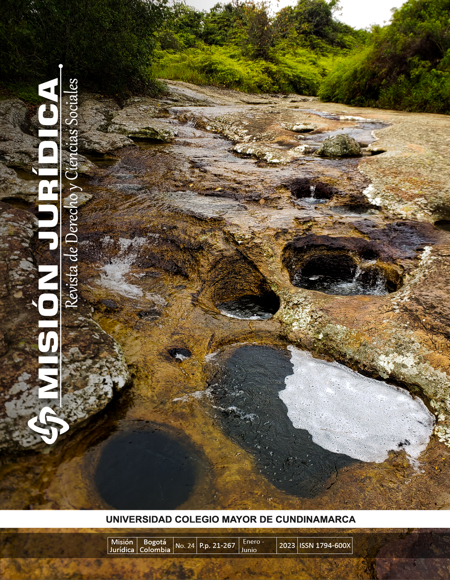'Modernity' and 'Capitalism' as determining categories in the transformation of the philosophical nature of the ejido in Mexico
La ‘Modernidad’ y el ‘Capitalismo’ como categorías determinantes en la transformación de la naturaleza filosófica del ejido en México
COPYRIGHT PROVISIONS
Every papper included in the magazine can be reproduced whole or in part, provided that respect for its original content, the source is acknowledged and is used with non-commercial academic. Legal mission and its content is protected under a license Creative Commons Attribution-Noncommercial-

Misión Jurídica is distributed under a Creative Commons Attribution-NonCommercial-NoDerivar 4.0 International License.
Based on a work in http://unicolmayor.edu.co/publicaciones/index.php/mjuridica/index.
Permits that go beyond what is covered by this license can be found at http://unicolmayor.edu.co/publicaciones/index.php/mjuridica/index.
Show authors biography
This work focuses, mainly, on establishing the main figure of tenure and agrarian exploitation in Mexico, called ejido, underwent a radical transformation as a result of the last great constitutional reform in agrarian matters that occurred in the year 1992. Which had as consequence that this agrarian figure suffered a change not only legal but philosophical. By changing its purpose and its social and vindictive essence, where the categories of Modernity and Capitalism had an importance in terms of the mutation of the agrarian paradigm in the country. This was done in order to fully identify the figure of the ejido to explain its current situation and find the causes of its stagnation and decline in the panorama of agricultural production and quality of life of the ejidatarios in Mexico. Allowing to understand how from the establishment of the ejido, this was an imposed figure in the country, to later suffer its great legal and philosophical transformation, which has as a consequence the current situation that exists in the ejidos in Mexico.
Article visits 63 | PDF visits 46
Downloads
- Alexander, J. C. (1989). Las teorías sociológicas desde la segunda guerra mundial. Gedisa.
- Balanzario D., J. (2006). Evolución del derecho social agrario en México. Porrúa.
- Borisov, Zhamin y Makárova. (1976). Diccionario de economía política. Universidad de San Carlos.
- Cámara de Diputados. (2021). Análisis Programa Especial Concurrente para el Desarrollo Rural Sustentable. Centro de estudios para el desarrollo rural sustentable y la soberanía alimentaria.
- Echeverría, B. (2017). Acepciones de la Ilustración. En nicht für immer! ¡no para siempre! Gedisa. pp. 137-148.
- Echeverría, B. (1989). Quince tesis sobre modernidad y capitalismo. Era.
- Cancino, J., Rello, F. (1977). Las desventuras de un proyecto agrario: 1970-1976. Revista Investigación económica. Núm. 141. pp. 135- 152.
- Durand A., C. H. (2017). El derecho agrario, y el problema agrario de México. Porrúa.
- Dussel, E. (2017). “Eurocentrismo y modernidad (Introducción a las lecturas de Frankfurt”, nicht für immer! ¡no para siempre! Gedisa. pp. 335 -346.
- Felipe G., O. (2018). Ecología política de la agricultura. El Colegio de la frontera sur.
- Fromm, E., Maccoby, M. (2007). Sociopsicoanálisis del campesino mexicano. FCE.
- Gandler, S. (2018). Hablar y escuchar en el capitalismo tardío. Reflexiones sobre la Teoría crítica de Bolívar Echeverría. Revista Horizonte de la Ciencia 8(15). pp. 33-55.
- Golden, S. (2004), Valores asiáticos y multilateralismo. En Multilateralismo versus unilateralismo en Asia: el peso internacional de los ‘valores asiáticos’. CIBOD, pp. 102-134.
- González N., G. N. (2012) Derecho Agrario. Oxford.
- Gutelman, M. (1974). Capitalismo y reforma agraria en México. Era.
- Kant, I. (1981). ¿Qué es la ilustración? FCE.
- Krauze, E. (1997). La presidencia imperial, Ascenso y caída del sistema político mexicano (1940-1996). Tusquets.
- Lemus G., R. (1983). Derecho Agrario mexicano. Porrúa. Lorenzo, C. (2011). La Teoría Crítica como fundamento epistemológico de la Bioética: una propuesta. Revista Colombiana de Bioética 6(2). pp. 118-127.
- Lucas S., J. L. (2000). Teoría de la Modernidad en Agenes Heller. Revista Ministerio de Educación, Cultura y Deporte. pp. 3- 20.
- Lukács, G. (1970). Historia y conciencia de clase. Editorial de Ciencias Sociales.
- Méndez M., J. S. (2009). Fundamentos de Economía. Para la sociedad del conocimiento. Mc Graw Hill.
- Montes de O. L., R. E. (1977). La cuestión agraria y el movimiento campesino: 1970-1976. Cuadernos Políticos número 14 pp. 55-75.
- Nahuel M., F. (2016). Honneth y Postone: dos teorías críticas de la modernidad. Revista Pilquen - Sección Ciencias Sociales 19(4). pp. 42- 64.
- Rodríguez A., R. (2013). La política y su devenir histórico en el pensamiento de Kant. Revista Ideas y Valores LXII (1). pp. 17-32.
- Ruffini, M. L. (2017). El enfoque epistemológico de la teoría crítica y su actualidad. Revista Cinta de moebio Núm. 60. pp. 292- 310.
- Silva, L. (2019). Marx y la Alienación. Fundarte.
- Sirvent G., C. (2019). “El artículo 27 Constitucional”. Los derechos sociales en la Constitución mexicana de 1917 y hasta nuestros días. Una aproximación filosófica para su estudio. Porrúa.
- Sotomayor G., J. G. (2019). El nuevo derecho agrario en México. Porrúa.
- Taylor, C. (2007). Dos teorías sobre la modernidad. Revista Académica de Relaciones Internacionales, Núm. 7 pp. 3-18. Trueba U., J. (1954). Tratado de legislación social. Librería Herreros.
- Villoro, L. (1992). El pensamiento moderno. FCE.
- Warman, A. (1998). La reforma agraria mexicana: una visión de largo plazo. Revista Reforma Agraria, Colonización y Cooperativas. pp. 2-10.















